#and the motifs! so many motifs! don’t know what they all mean yet but there’s so many motifs!
Explore tagged Tumblr posts
Text
“Musical about a green magic girl who's totally alloaro, trust me, where are you going she's alloaro, I have a whole powerpoint presentation stop backing away from me I have proof she's alloaro just listen to me” - Things I tell my friends to try to get them to watch media I like
#okay; i don’t actually have a powerpoint presentation or an essay or detailed notes yet#and that’s in large part because i don’t have a good way to access the story beats that occur not in song#and that has to do with the fact that stage musicals need to be treated differently than movie musicals#when you want to go about analyzing them;#so it’s entirely possible that there’s parts of the story i don’t remember that either#make it hard to view elphaba as alloaro; or make that interpretation/headcanon problematic;#but cmon. if you look at the original broadway cast recording she’s _clearly_ alloaro#the green the ostracization the voidpunk the imperfect girl she isn’t#and the motifs! so many motifs! don’t know what they all mean yet but there’s so many motifs!#wicked#aro#alloaro#allosexual aromantic#aromantic#aspec#queer#lgbtq#original
111 notes
·
View notes
Text
One underrated aspect of Benrius I haven’t seen talked about: the soundtrack
I don’t know how many musical nerds are there in the camp cretaceous fandom, but if you’re like me then you’ve likely noticed that Darius and Ben are the only main characters to have their own leitmotifs:
No other campers get this treatment, not even Yasammy (they do get a joint theme though which is super cute in its own right)
So why is this a big deal? Well, a character’s leitmotif is basically their trademark, the thing that instantly brings their faces to mind when you hear that specific tune. Think Darth Vader and The Imperial March. It embodies their soul in a sense, shifting in keys and tempos as their journey takes them through joy and sorrow, but never straying from the core signature melody.
A character’s leitmotif often plays when they enter a scene, subtly telling the viewers that hey, this is their moment now, pay attention to them. So what happens when two leitmotifs meet? Well, it could mean many things, but mostly it is meant to imply a significant connection between the two characters they represent. The connection could be antagonistic, friendly, or...
Intimate.
Hear how both their leitmotifs flow seamlessly from one to another, lifting each other up and cornily accompanied by an angelic choir no less. Notice how despite Ben being the one speaking, it is Darius’ motif that plays, because Darius is the star of the scene, the receiving end of Ben’s attention and love. And then, as Darius returns the affection, the score shifts in turn to reflect it, playing Ben’s theme as Darius redirects all of it back to Ben, physically too I might add.
Musical storytelling is an oft underrated aspect of TV and movies, yet when done right it conveys just as much as visuals and dialogues, as any LOTR or Star Wars or Hamilton fan would happily point out to you in much more eloquent words than I can. The story of Darius and Ben is one of subtlety, of stolen glances and longing nights, reflected in the music of their hearts.
#benrius#yasammy#darius bowman#ben pincus#darius x ben#jw:cc#jw:ct#music#leitmotif#music analysis#character analysis
66 notes
·
View notes
Note
ah i see. so becky chambers has fallen into the “you don’t owe anyone anything = the bonds of community/the social construct are pointless oppressive structures” and “self care = doing whatever you feel like” traps huh.
also irt the person asking for antidotes to becky chambers: CANNOT recommend a memory called empire and a desolation called peace enough. The author is so so invested in exploring her alien cultures and iirc she has a linguistics/history/anthropology background so she can actually pull it off. And the main characters are all well developed and complex and deeply flawed while still being likeable! (Hopefully artemis you haven’t already read and hated these books lol)
Hah I simply haven't gotten around to reading those yet, no... they are On my List... 2 many books
“self care = doing whatever you feel like” is definitely there, but it's not even so much that the bonds of community are pointless, it's more... it's okay if you do nothing, because the Bonds of Community mean that other people will be okay with it and pick up your slack no matter what you do. Sort of? A Prayer for the Crown-Shy was so muddled in its themes that I wasn't fully sure what, exactly, she was going for by the end. Mosscap is on a quest to determine what humans need, and nobody can articulate anything in particular that they need or want, because they don’t know, because everything they need or want is provided by their perfect society. In this perfect society, nobody wants for anything, which means nobody wants anything. Except Dex. Who can't articulate what it is they want. And it almost seems like that's treated as a problem with Dex, something Dex needs to get over.
A surface motif of “I’m OK you’re OK we’re all OK and that’s OK” and “you deserve a chance to rest, you don’t need to know where you’re going in life, and that’s OK” is all well and good, I can support that, but the presentation was all over the place. At the end, she even seems to recognize it, and try to address it. Mosscap reveals that when it asked "what do humans need?" the most common answer it gets from people is "a feeling of purpose." But it just kind of makes everything more muddled. Do humans need a sense of purpose? Or is trying to find your Purpose just making you unhappy and you need to just, stop caring if you have a Purpose or not? Mosscap treats Dex's search for a Purpose In Life as almost disordered, like something they just need to reframe their worldview and then get over and be happy doing nothing and going with the flow. Dex's deep longing is almost addressed, but then just... not. Mosscap's position is that Dex should basically just get over it, embrace doing nothing, and hang out with it on the beach. And so they and Mosscap blow off their obligations to have fun on the beach.
#asks#serenity-the-firefly#Monk and Robot#it would be one thing if it was just a thematic conclusion I disagreed with but I'm not even sure what the intended thematic conclusion IS
45 notes
·
View notes
Text

ok the topic of barty crouch jr and the bone motif came up, but his specific phrasing here is what really sticks in my brain & is the basis of my stance on barty’s story as an allegory for bodily autonomy. yes there is something obviously satisfying in a character who spent 12 years under imperius, his body used a puppet, choosing to murder his abuser through transfiguration rather than a more conventional method like the killing curse. this is the only instance of death-by-transfiguration in the series. but i think the way he phrases this (became a bone, not ‘turned into’) belies a deeper understanding of barty’s relationship to having a body in general.
barty crouch being denied bodily autonomy goes far deeper than the imperius curse. i see it as sort of a haunting refrain that characterizes his entire life actually. he goes from servitude, to imprisonment, to switching bodies with his mother, to the imperius curse (kept under an invisibility cloak— he can’t even see himself), to the polyjuice potion, to that ironic “death” by the dementor’s kiss; his body goes on without his soul. it’s worth noting that the only time barty appears on-page as himself his body is controlled (yet again!) and forced to speak under veristaserum. do you think there was a strange comfort in that, for him? i just mean that he’s never known anything else.
i want to look at this through a hypochondriacal lens, where the experience of having a body (or being embodied) is a contestatory relationship wherein the mind strives for order/structure/immutability but the body is inescapable— it brings disorder, change, and a continual loss of control. the body is both fundamentally unknowable and hurtling towards death and illness: the hypochondriac seeks to rationalize & control this, but it’s ultimately an exercise in futility. i see these anxieties really present in barty crouch jr’s character: someone whose body has been puppeted or transformed into a different shape more than it has actually been his own.
i’m not saying that barty IS a hypochondriac (he’s not), but that his character arc functions inside the same epistemological framework: one where the unruly body is a prison because of how it’s subject to/harbinger of continual change. but this relies on a really clear division of the body and mind as separate entities. or even, like, a division between the body and this more ephemeral idea of “the self”— a soul that resides in the body but is somehow separate from it (and we know the soul is canon in the world of harry potter). barty crouch collapses this dichtonomy in a really interesting way with his statement: his father became a bone. as in, he is no longer himself and he is just that bone now. barty is introducing the idea that the soul doesn’t really matter or even exist, and that once your body takes the shape of something you fundamentally are that thing, for better or worse.
and i don’t know! this strikes me, especially coming from a man who has lived twelve years as an empty vessel— why would he believe in a soul if his has been erased and overwritten so many times? his own sense of self is too stifled and warped and stunted. this is the same character who was able to embody moody so fully and convincingly that it was impossible for even dumbledore to tell the difference. i think this was possible because of barty’s weird relationship to embodiment, where his actual “self” is hazy and loosely defined— perhaps the result of so many years having it denied, stifled, or unable to develop— but he becomes whatever shape his body is taking. (it’s interesting to note, too, that barty didn’t say that he transfigured his father. rather, he “transfigured [his father’s] body”, and this was enough for his identity to dissipate and him to become something else). to barty, the “self” is not an independent entity that is subject to the body’s change and disorder— his “self” is the very body itself, and all the fear, and change, and loss of control that comes with it.
this is why the ending with the dementor’s kiss gets me so bad. if the body is all he really is, then this fate is the perfect closure. barty is finally reduced to all he has ever been: erased. an empty vessel. just the image of himself, with nothing inside it. what’s really changed?
#barty crouch jr#how do i even tag this. mucho texto#UNDERSTANDERS WILL UNDERSTAND!#barty meta tag#saints speaks 🐇
256 notes
·
View notes
Text
Okay so I’m currently in Love and Deepspace hell and now it’s everyone’s problem. I may not entirely ever understand what’s going on, but that’s okay I’m still going to give my two cents on what Caleb may bring to the table. Please correct me if I’m wrong😭
LOVE AND DEEPSPACE MAINSTORY SPOILERS AHEAD!
1. Ties to EVER
Hear me out here. I know this is a common speculation but I want to delve into it and lay out the facts where I can see them. We kind of know what EVER’s goal is, we also— according to the notes we collect— know where their investments lie. They play a dominant role in biotechnological developments, aerospace, Evol energy, and international trade. We also know that Caleb works as a fighter pilot for the Deepspace Aviation Administration. He attended the Aerospace Academy in Skyhaven: an artificial floating island above Linkon. From what I gather, Skyhaven is powered by a protocore— and EVER is known for their involvement and use of protocores in modification/advancement. With what is made known to us it’s safe to conclude that Caleb is an affiliate. It’s hard to say whether or not he knows about the aether core, assuming he does though, he knows that upon the experiments— MC is basically immortal. She would be an asset to their research, and goal of extending lives. I wonder if Caleb feeds them this information, but at the same time— I’m just… not fully sure, seeing his particular niche and all. It does feel like they have their eyes on mc, though… I don’t entirely remember, but in awaited revelry, doesn’t Sylus imply that Josephine and Caleb have malicious intentions…? That being said—
2. Caleb’s return..?
I have a speculation that, like many cases we see (albeit some failed ones), he’ll be resuscitated via protocore; EVER can’t lose a valuable asset, after all. It fits thematically, and can further establish Caleb’s character as a character foil to Zayne (who despite his regrets, feels that death is a necessary part of the human existence.) An apple a day keeps the doctor away and all! This is the first ML we know that actively has interacted with another, and I genuinely can’t wait for what this means for Zayne’s story, even if EVER isn’t behind Caleb’s heavily implied return. He’s still facing what should be a dead man, and ugh. I KNOW his emotions are going to pile up. Staring directly at the Mt. Eternal anecdote. This could be a stretch, but— Carter, Xander Sciences trying to rope Zayne into their projects over and over— MC is the perfect bait, and bringing Caleb back may establish MC’s direct involvement and have Zayne be enticed by proxy. Caleb does play the role of the forbidden (potentially), and this could be how that motif comes into play.
3. Snake Motif…
Okay so I have yet to do my research on this entirely, but like— I just think it’s so interesting that they released Sylus during the year of the Dragon, and then potentially Caleb, during the year of the Snake. That aside, though— the clear biblical connection between the snake and the apple and potentially being that lure— what snakes generally symbolize (mystery, deceit…), and I saw this floating around somewhere, but apparently in CN he calls the MC ‘little tail’? I’m so interested in what this could mean symbolically with all his apparent affiliations, buuut that’s for us to see.
I’m looking forward to that livestream and tbh idk if anything here made sense but I’m so normal about this game (even if I likeee barely understand it.) What are you going to do Caleb. What’s happening. I know this is different from what I usually post here but I NEEDED to yap or else I might go insane idk
What are you hiding.
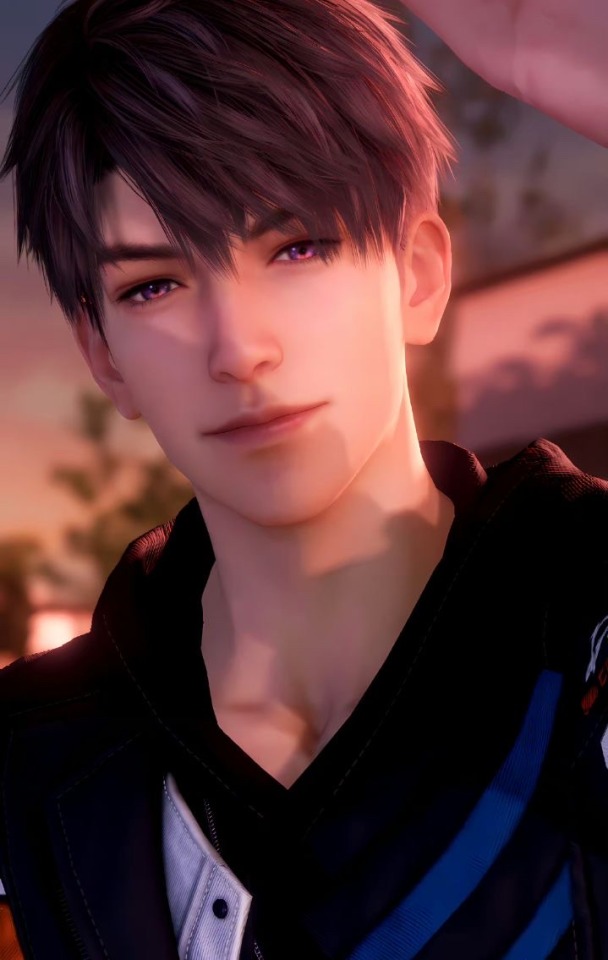
#love and deepspace#lnds#lads#love and deepspace caleb#caleb#lnds caleb#lads caleb#lnds theory#fan theory#the lore is so confusing#but so good#caleb soon#love and deepspace zayne#zayne love and deepspace#lnds zayne#lads zayne#caleb love and deepspace#mc love and deepspace#love and deepspace mc#lnds mc#love and deepspace theory#fandom
45 notes
·
View notes
Text
Now that the Ithaca saga is out, here are some of my fave things from the musical:
In no order, just as I thought of them.
1. Different beast: “we are the ones who feast now.”
I think you mean feasted ON. Cause guess what songs next? Oh look! Scylla! Who feasts on them!
(I love it sm I laugh everytime they say that line.)
2. What? Saga.
All the “HUH? WHAT? WHO? WHERE??” From ody always is so funny, especially those compilations on tiktok for it lol.
3.ody being this really smart man but so fucking dumb at the same time (ties to the last one)
No longer you is SO GOOS. And I love hearing his confusion while (I forgot his name but the guy who sings mainly in that song) like this poor man is just trying to explain it over and over and ody is NOT CATCHING THE HINT.
4. eurylochus singing like a girl.
Just- the concept that he is mimicking circie in that part brings me so much joy holy. Just the
“A woman.” “What??” “She had us in just two words… (activate girl voice) COME INSIDE—“
5. Scylla.
No other words, just Scylla. Best song untill the newest saga but still top three.
6. Circie.
Again. Litterally all her songs are INCREDIBLE. I remember watching gigis concept animatic for the like leaked bits and LOVING IT SO MUCH. Like gigis design is SO GOOD FOR EVERYONE BUT IT ESPECIALLY EATS WITH HER.
7. JUST A MAN MOTIF.
I don’t have to say anything. Just— it’s so good.
Infact all the motifs are TOP TIER.
8. I saw someone point out once that as Athena got to know ody more that she started not just doing straight notes and riffing and stuff. Like-
DAMN THATS SO COOL.
9. All the animatics. Like DAMN YOU GUYS ARE QUICK SND SO TALENTED!!!
10. Jorge himself, everything he has done for the fans, being the incredible man he is and incredible writer and singer. He is just such an incredible person, such a talented artist in general. He genuinely deserves all the fame he has and SO MUCH MORE. Ik that all the time I recomend this musical to everyone and their mothers. Genuinely I think I’ve gotten atleast four people into the musical.
11. Time paused. Athena’s time ability is SO COOL. Honestly Athena’s songs have always been some of my faves, my goodbye and warrior of the mind were ones I listened to on repeat when they first came out, and I still do! I love little wolf SO MUCH. Like seeing her so much in the wisdom saga after being missing was so incredible. Genuinely one of my fave characters.
12. How well emotions are convayed. I mean it’s insane how well the actors portray each emotion from the characters, such as telemecus in Odysseus, or in little wolf etc. it’s SO cool.
13. Open arms.
The motif of polities is INCREDIBLE. The poor vas character died so early yet was NEVER given a break. I think I saw he’s in so many of the songs like damm.
Especially in Odysseus with that one suitor saying “open arms”
Anyway more later. Love you guys.
20 notes
·
View notes
Text
Why do we talk like that about Gintama?
So this is something I've already talked about a lot here and there, but I thought I would condense my thoughts on the topic in its own post.
We've joked a lot about math zeitgeist, but why in the world are we furiously mathposting about Gintama? Why did I write 28 pages of actual essay for it? Where does kraniumet get all those images from? (I've always wondered this.) Essentially, what's driving us to analyze these themes and motifs over and over again... and why can they be analyzed over and over again?
When I first wrote My Orochi Stood Up, I made it clear that this was an original framework made for the same purpose as all analytical frameworks and models: to enable me to gain certain key insights about the series, to account for all of its innumerable bits and pieces, and to arrange their relationships to one another in a cohesive, legible way. In short, as I wrote in my essay, it provides me with symbolic technology.
In the same vein, when I wrote my spontaneous math post, I said that so much of math is about things that don’t exist and yet become real, not just because they help you articulate something but because they help you arrive at a solution. This is the purpose of things like imaginary numbers--or negative numbers for that matter.
I know that we should never live life in accordance with the fake hater in our heads that we imagine saying stupid things to us so that we can respond to them in smart, cool ways. I'm sure Zura lives like that though, and we all think he's charming, so maybe we should reconsider this idea. What I mean to get at is that I've never once tried to claim that Sorachi literally intended any of what I describe in my ouroboros framework. I don't think he sat down one day and planned to make his motifs compatible with western alchemy, I don't think he had the creation myth of the island of Japan in mind, and I don't actually think he read Barthes.
But what's undeniable is that there is something so bizarrely consistent, coherent, and plentiful about Gintama's thematic flourishes--even though in many, many ways, Gintama is filled with bad, and worse, mediocre, writing. What sets Gintama apart from other series isn't the inherent quality of its writing (which has stark ups and downs). If you'll forgive the confusing and somewhat contradictory wording, what makes Gintama distinct isn't a quantitative difference (as in, more goodness), but a qualitative difference. What does this qualitative difference boil down to?
First is structure. This part we've gone over a lot, so I'll try to keep it brief (or novel?). Gintama is a series with basically just one favoured literary technique, and it uses it again. and again. and again. and again. and again. Parallels upon parallels upon parallels--and there are only a few key thematic ideas that Sorachi is interested in exploring. You can describe it as consistency, or, if you want to be uncharitable, repetitiveness. But it is, frankly, absurd the amount of parallels--or rather, the degree of parallelism--this series contains. What's interesting about it is its effects on how we engage with the story.
By making it obvious that this is a conscious and explicit writing decision (through various means, mainly dialogue), any characters with suitable parallelism to a prototypical character A are all connected to one other--let's call these the A-sided characters. This holds even if they're all a bit different from each other. Imagine all these A-sided characters spread out in line, like hostages tied to each track of a train track or the rungs on a ladder. They lose similarity with each rung, like loss of clarity in a game of telephone--let's call this "reflection lossiness." Even though characters in the top rung and the bottom rung may not have much in common, they may both be within "lossiness range" (<- I just made this up) of a character in a middle rung, and therefore able to communicate indirectly with one another.
Moreover, because the prototypical character A has a foil in prototypical character B, all A-sided characters are also connected not only to any individual foils they may have, but potentially to all other B-sided characters. Since it's easier to identify characters' thematic affiliations through their interactions and dynamics with other characters, the consistency of the A-B foil formula, when combined with the fact that animanga foils are generally made very obvious, helps us perceive these diagonal relationships. Thus, the reader can squint at the interactions of almost the entirety of Gintama's enormous cast with valid suspicion, with less difficulty than in other works with more complex structures. The series' sheer length also ensures that there is an abundance of material to comb through, so much so in fact that this careful inspection, through rereading again and again, becomes necessary.
For instance, the interactions between any given pair of characters may not seem directly relevant to our protagonist at first glance, but once you know the magic A | B schema, you may notice that that pair's interactions resonate with that of a different pair, one involving an A-sided character with less reflection lossiness from the top and who therefore reflects much more of what happens to them onto Gintoki. In this way, the original pair, who are probably just a couple of minor side characters who appear once in a weird arc and then never show up again, can make you go, "hey wait a minute. what if?"
What if?
Let's look at a concrete example. Housen and Utsuro don't seem to have much to do with each other at first glance. However, because we know that he parallels Kamui, and that Kamui | Kagura parallel Takasugi | Gintoki, who in turn can be mapped onto Utsuro | Shouyou, we can arrive at a Housen-Utsuro connection that wasn't previously obvious. What is the utility of this connection? For one, it sharpens our ability to articulate how the hole-sided flee from the things they fear and yearn for by adding Housen's infamous avoidance of the sun into the analysis. It also provides new ground for exploring potential ideas comparing, say, Kamui choosing to leave with the Harusame and walk in Housen's footsteps, with Oboro's resigned embrace of the Naraku and Utsuro. Additionally, since Housen was defeated in Hinowa's lap, this also helps us draw a Hinowa -> Kagura connection, which helps us arrive at a Hinowa-Shouyou connection, which helps to reify that Shouyou is a milf.
By inserting one or two blatant instances of foreshadowing and parallelism early on in the series, instances that are impossible to pass off as coincidence, Gintama primes the reader to suspect that similar nuggets might be hiding anywhere, to check every garbage can we encounter from there on out like in the Pokemon games.
Whoops. In attempting to explain the math zeitgeist I succumbed to using math in my explanation. It's irresistible.
But that's structure. Let's move on now to something arguably even more important: motifs.
It's undeniable that for a shounen series that's half gag-manga, Gintama has a strange amount of analyzable motifs, and a clear loyalty to them. Regardless of how extravagantly people on tumblr dot com may want to overanalyze their favourite Shounen Jump series, their efforts are usually restrained to theme and characterization. Their ravings do not usually resemble the ravings of the Gintama Salon. If you've read this far, I don't think I need to explain this to you, or what Gintama's most prominent motifs are. But why is Gintama so motif-ful? The sword's importance is obvious, expected even, but what differentiates Gintama from, say, Bleach, where the characters' swords also literally represent their souls in a way?
In the end the answer is what I already discussed in My Orochi Stood Up, the foundation of my entire framework, in fact its very title: the dick joke.
Sorachi's immature sense of humour is the glue holding the entire thematic and narrative structure of Gintama together. Why do we search obsessively for meaning in the flotsam of Gintama's less narratively charged moments? Because, quite frankly, many things are phallic. The sword is no longer simply a sword--by being imbued with the spirit of the dick joke, it becomes not only valid but textual to associate it with the head of the nation (shadow juice squirt), the motif of the dragon (thank you Elizabeth), and castration. What I mean is not whether the sword can be read as a dick--obviously, phallic logic has been prominent through all of human history--but the way in which Gintama's sexual humour gives us--and itself--an impetus to equate motifs in the first place.
Comparing very serious things to dicks is funny--the more abrupt, the more shocking, the more mood whiplash, the funnier is. Therefore, for Gintama's toilet humour to be as effective as possible, tone dissonance is ideal, pushing it towards the intermingling of comedy and tragedy that we know it so well for today. This in turn validates and reinforces the meaning-making role that these phallic jokes play in the story as a hole. It is not only that we cannot separate the dick jokes from the serious delivery of the plot, but that in many arcs important information is given to us through ridiculous gag devices (ball gags?).
The logic of basic sex jokes is extremely simple, intuitive, and easy to understand. The prominence of the pole necessarily implies the presence of the hole. I've talked about that enough in my essays, so I won't go into detail here, but the reason that I wrote my essays in the first place is because of how easy it is to map a procreative framework onto a series filled from beginning to end with phallic gags. As much as I may joke about it, the underlying logic of "the pole and the hole" is powerful and compelling, providing connective tissue to seemingly disparate motifs with ease. When combined with the "sorting" power of the A | B structure, the ability to associate any particular character with any particular motif easily gives us the ability to analyze how a given set of characters interacts with a motif; equally, where the motif sits in Gintama's playing ground of phallicism can inform a given character's dynamic with others.
I've already written at length about the role that wordplay plays in this as well. To save on time, I'll just quote from My Orochi Stood Up:
Gintama’s insistence on wordplay enables interesting meaning to be derived from these dirty jokes and their interaction with other motifs in the story. After all, the name of the series itself elevates the spirit of the balls joke, even if unintentionally, to the same level as the other metaphor in the title: “silver."
But perhaps the singularly most important example is the -tama in Gintama, with its plethora of potential meanings, each of them just silly and dirty enough that you have to take it seriously. Beyond the obvious joke on kintama (balls) and the “silver soul” meaning, we’ve seen that tama is also easily conflated with atama (head), and even with tamago (egg). This is clearly demonstrated with the series’ fixation on beheading leading to the salvation of the soul, and the bodyswap arc hinging on the pun between soul and egg.
In short, it is the comedic aspect of Gintama that fuels the series' own willingness to conflate and play with its motifs, and that validates--provokes--our mad efforts as readers to draw unlikely connections and dig through dirt. Though it may seem more ridiculous on the surface to be taking such a magnifying glass to such a profoundly silly series, it is in fact more justified for Gintama than it would likely be for a more serious series, one where the paths between motifs are not pre-paved, let alone lubricated with shadow squirt juice.
I was recently introduced to a theory of comedy where comedy was posited as an interplay between excess and lack. How this maps on to Gintama is obvious; but one thing that comes to mind now is how easy it would be to characterize our scholarly efforts in examining Gintama, a series one could humorously characterize as "lacking", as a kind of excess. Which is to say, I think Gintama has pulled its penultimate trick on us (because it's still coming out with more stuff for the anniversary. I believe it.) by making us part of its comedy.
61 notes
·
View notes
Text
Collection of wisdom saga thoughts:
(None of these are in chronological order it’s just whatever pops in my head :P)
- Athena calling ody her friend in we’ll be fine vs ody calling Athena his mentor in monster????? That compared to my goodbye???? Fucking brutal. They’ve both changed so much after losing each other bro. OW
- LOVE that in little wolf the suitors are always using the chorus as like a taunt, bit it never fits into their dialogue it just kinda interrupts it but then Athena comes along and the chorus ties directly into what she’s saying, like “don’t go down without a- fight little wolf fight!” It’s really cool how it shows his opposition vs his allies I love it
- also just. so many shrimp emotions brought out during legendary and we’ll be fine. guh
- the video game aspects were so cool!!!!!! Love the one on one with Telemachus and antinous with the mortal combat-esk animation that went along with it!! And in god games how every time Athena convinced a god it played like a level up sound effect!!! Suuuper interesting :D
-CALYPSO!!!!! HER!!!! The first time ody has faced an enemy that doesn’t mean him any harm (harm as in like. trying to kill him, obvi she still did some fucked up shit to him) but might actually be the worst one out of all of them because he just misses his wife so damn badly. Don’t even get me STARTED on the fuckin “ody” and “open arms” shit bro that HURT
- Did I mention I love Telemachus? I love Telemachus. He’s so ambitious and so so kind and has such a good heart I adore himmmmmm <3 Despite never really being able to meet his dad aside from as an infant, he looks up to him so much and respects him and wants to be like him, and I’m sure that’s all Penelope’s doing <333 the wife and husband ever, actually. they invented heterosexuality and true love
-GOD GAMES!!!!!!! While I’ve seen plenty of understandable criticisms, like it being too short or fast-paced, I think jay did the absolutely best he possibly could with it!! It’s so fun and gives us such a good glimpse into the thoughts and priorities of all of the gods and ATHENA!!! WHAT A QUEEN!!! UNMASKED WITTY AND QUEEN OF THE BEST STRATEGIES WE’VE SEEN FRRRRR!!! Also I’m fuckin obsessed with ares’s voice it sounds so coollllll AND ZEUS’S GROWL BROOOO it’s so impressive I wish I could do that. I’m also gonna have the way they say Aphrodite and hera in my head forever I owe them my life
- I know jay talked about it in a short, but I actually really enjoyed the differing perspective!!! Don’t get me wrong I miss my boy ody and I’d love to know more details about his situation but I’m so incredibly happy we got an Athena pov I have so much more appreciation for her she might be my favorite character now
- I’ll never get over all of the unique character motifs and just how unique they sound. Like how Circe and calypso sound so similar yet so incredibly different, just like their stories!!! Jay you legend
Ok that’s all for now back to listening on repeat
24 notes
·
View notes
Text
League of Shadows: Detective Comics #951-956
Wow. Just wow.
I knew Tynion IV was working overtime to try and get a level of normality re-established in Rebirth Batman, but he has so many moving pieces going on here.
First up: this is the Cass and Shiva story, so it’s rehashing and re-exploring the most vital elements of Perfect For A Year and Destruction’s Daughter.
It’s not a perfect blend, for a bunch of reasons, but I respect the effort involved.
The bit that blew me way however? Tynion brought in Carolyn.

Cass content where she is given inspiration by her aunt’s words??? I mean. I am listening.
Kate Kane gets to approximately play Babs’ role in the push-pull over what Cass needs against Bruce.
Cass in the Mud Room obsessed with winning fights and working through her problems of course perfectly reflecting Cass in Babs' equivalent holoroom doing exactly that as a way of dealing with her emotions.
Cass gets two fights with Shiva, and she of course loses the first and wins the second.
Cass running around with swords? Some people might say that’s not Cass, I say hello Kasumi and BatO 2008 references!

(Tragically Cass didn’t get to stab Kendra and keep that motif running, but alas no Justice League appeared in this book)
Cass and David together flashbacks still don’t feel entirely on target: previously when Cass has gone to David to answer her questions he would eventually give her what she asked for, not deny it to her. But David Cain was left in a horrible state post B&R Eternal so any writing even slightly more on track was helpful.
It's also fascinating to me that we go to this very heavy Cass story, leaning into her growth as a person and moving from being a lurking shadow who is a vigilante only to someone who is making civilian friendships and connections and doing things outside of simply being a vigilante (going to the ballet in person with Bruce and Kate escorting her) happens in a period when Steph has left. This is echoing Cass' Bludhaven arc! Argh Tynion knows the whole of Batgirl 2000 so well.
And Shiva. Oh, Shiva. I have to say, as always, I’m not thrilled when Shiva is directly linked to Ra’s Al Ghul, but admittedly we were redoing Destruction’s Daughter, so Shiva being called in to train League assassins is on target (though it was Ra's this time, not Nyssa), as was Shiva not actually working with Ra's ordinary troops so much as the set he was using for the League of Shadows.
What I also liked: Ra's trying to manipulate Shiva using what he knew of Cass, and Shiva not being fully on board with what Ra's was selling but synthesising it in her own way.


I don't love Ra's being more involved in Shiva's backstory, but I did enjoy her arguments with him, and the way Shiva, despite herself, became compelled and interested in Cass as a fighter more than as her daughter. (Daughter? raw material, boring. Fighter with that skillset who happens to be my daughter? deeply fascinated).

Just picking out a few scenes here, but I feel this does add an additional layer of depth to Shiva's motivations? That she knows she burnt everything away in the fire of Shiva, but also she has a level of regret over it all.
And then that being reflected in part of what gave Cass the understanding of how to defeat the League and Shiva was the words of Carolyn and her message of how to act as a shadow yet still find yourself? A message Sandra has lost but Carolyn protected even in her death, because Shiva has worked to slough off Sandra, but that is still a loss.
On top (on TOP) of this storyline being a synthesis of Batgirl 2000 into 5 issues, Tynion was just packing in the references.
The atomic bomb to open a faultline under Gotham and *checks notes* make the city fall into a cavern below? Is that Cataclysm, 'Quakemaster' (aka Ventriloquist) holding the city hostage over an even worse earthquake I spy? Because. The vibes were very much there. But on top of that, it's also a version of the Batgirl story of Alpha hiding a fusion bomb in Gotham and Cass needing to track him down to work out where that bomb was.
Shiva and the League of Shadows having a special technique of stabbing people with swords through their chest in a way that doesn't damage any organs. Shiva, is that you saying The Widower was bad at his job? Because most of those sword wounds were similar in location to Tim's one from The Widower but specifically on the other side of the body to avoid the spleen.
Ulysses Armstrong continuing to be the creepiest kid absolutely obsessed with Tim as Robin and trying to 'get into his skin'? Ulysses being in the military now via Jacob Kane's secret organisation yet still completely and utterly hung up on Tim and trying to prove himself is commitment to Tim's Robin run.
And then we get to this: to Ra's telling Bruce that inside the League of Assassins he has a secret League of Shadows, which he has concealed from Bruce and forced him to forget.
But the important bit here to me is Ra's saying Bruce has uncovered them three times before. And we get this series of pictures.

The first is an underground cavern lit by an orange glow (this looks very much like an orange Lazarus Pit in the background: references this resembles include Son of the Demon, any of Nyssa's pits, Matt Wagner's Trinity and a bunch of others).
The second is Bruce standing shirtless on a frozen lake, surrounded by mountains. (Can you say Batman Begins? But also technically you could map this to Bride of the Demon I guess by the art team not realising Antarctica doesn't have trees. Or frozen lakes like that. His first shirtless duel with Ra’s is Batman #244 but that’s in the desert. The various Nanda Parbat and Himalaya fight scenes I reviewed don't look much like this)
The third is Bruce being taken down in what looks like a fancy office (my first thought was possibly Tower of Babel & Dependence, but this again could be a lot of occasions).
And the focus here on Ra's having concealed Bruce's memories and forced him to forget events, in Rebirth stories where we are pushing at the timeline to extend it out again and backfill it with post-Crisis content? A genius way of focusing on there being stories that n52 Bruce doesn't know.
I've been trying to work out exactly which stories Tynion is claiming these three 'discoveries' of the League of Shadows occurred during, and I can't quite pinpoint three specific occasions. But they are so very, very familiar. I do wonder which he was specifically thinking about.
#z canon read throughs#seriously Tynion is SO GOOD#I keep rolling his stories around and around in my mind#recent reads
29 notes
·
View notes
Text
How I'm thinking it's going to work (for now, subject to change):
General:
THIS BRACKET IS NOT ABOUT WHICH CHARACTER IS THE MOST MORALLY GOOD! MORALLY SHITTY CHARACTERS CAN STILL BE WELL-WRITTEN AND INTERESTING, WHICH IS WHAT MAKES A CHARACTER A GOOD CHARACTER. I just want everyone to understand that going in.
I am doing my best to collect every single canon character in this entire series. I will release the full list soon. Having said that, I am only human. It's possible I'll miss someone. If you have an attachment to a very minor character that I happen to miss, send me an ask, either to here, or to my main @dark-night-star-light. Anon asks are always on!
You can only submit canon characters. No OCs allowed, sorry. But you can submit a canon character regardless of how irrelevant or minor they are.
Voter fraud* and bribery** are not allowed. I know, I know, other fandoms allow them. I'm not, because the small-scale size of this fandom means that could actually make a dent in our results. I won't actually know if you do it, but if I find out you did, your vote will be eliminated.
This is meant to be fun! Try not to get too butthurt if your fav gets eliminated in the first round. I know a few of mine will, since they're such minor characters.
The unique tag is #best spirit animals character 2024. So if you want to participate, but don’t follow this blog, you need to be checking that a lot. Everything will be also tagged #spirit animals, #spirit animals books, and #spirit animals series. If you want to campaign, I recommend using the unique tag.
If you have any questions, or disagree with a rule and want to take it up with me, both my asks and DMs are open, both here and on my main.
Propaganda:
I am allowing propaganda. I am going to put it to a vote whether to allow anti-propaganda or not. Stay tuned for that.
I have still not created the full list of characters yet. That may take a while. In the mean time, you may start to submit propaganda to me. Ask box is open!
I will accept your propaganda if you make it about a ship (ex: Vote Shane, he’s so in love with Abeke!!!), but I don’t recommend it. In fact, I discourage it. But it’s allowed.
You can submit headcanons about a character as propaganda. Propaganda doesn't have to have any basis in canon (giving the more minor characters a fighting chance).
You are not allowed to submit links to analysis posts (or any kind of post) as propaganda, even if it's yours. Everything submitted needs to be something you wrote specifically for the bracket. If you send me a link to a post, it's an automatic delete.
Other than the above, there are no restrictions on what can be submitted as propaganda. It can be as short or as long as you want and as serious or ridiculous as you want (you could literally submit, like, "Vote for Rollan, he's so funny and he needs a hug" as propaganda and I would accept it, or you can go deep and start talking about his parallels and arc and motifs and backstory and personality and hardcore analysis stuff, and that would also be fine).
If you're unsure what to write, I'm going to release a piece of Shane propaganda I'm writing soon. Hopefully it inspires you. But again, there are no restrictions! Your propaganda doesn't have to resemble mine.
If I allow anti-propaganda, there will definitely be restrictions. More on that later.
If multiple people submit propaganda for the same character, I'm keeping them all. My goal is to have most characters have at least one piece of propaganda, so in the interest of that, as we approach the beginning of the tournament, I'll make a list of every character with how many pieces of propaganda each currently has. This is so that if a character has no propaganda, it would be a warning to everyone that it's your last chance to submit for them.
Propaganda is submitted through asks or DMs! You can submit for as many characters as you want. You will be allowed to be anonymous or not. If you choose not to be anonymous, you're signing up to be tagged in the poll that features the character you submitted for. So be aware of that. I may decide to open up a Google Form if I'm not getting any submissions. But we'll take it as it comes.
You will be allowed to submit propaganda throughout the tournament! If you decide to submit propaganda during the tournament, it will be added in the next round. Unless the character gets eliminated, in which case it won't be added at all.
This isn't really a propaganda thing, but it's propaganda-adjacent: campaigning. Campaigning is 100% allowed. There are no restrictions on campaigning except "Don't be rude". You will be allowed to campaign, and light-heartedly bash your vote's opponent (just make sure it doesn't get out of hand). You're allowed to spam the main tag or the poll with "Vote for [character]!" posts and reblogs. You're allowed to send people asks begging them to vote for [character]. In the end, it's their choice, but you can campaign as hard as you want. In fact, if you go into a poll and don't immediately know who to choose, because you like or dislike both characters equally, I recommend not voting for a while. The campaigners may be able to sway you to one side or the other.
I will submit propaganda for multiple characters. I may or may not choose to credit myself, it all depends! I will definitely be campaigning for some characters. Hopefully, this will encourage other people to campaign, too. That's half the fun of best character brackets.
Format stuff:
There may or may not be comeback rounds. It all just depends on where we're at and if I need characters to come back to create an even number. Don't count on them, but don't count them out, either.
It seems some people here haven't read the entire series, but I would still like them to be allowed to participate fully. So, I'm going to put an official description for every character, maybe a sentence or so long. This is meant to be objective, canon, and not propaganda (ex: Rollan is the Amayan Hero of Erdas that summoned Essix the Falcon).
Every poll will last one day, then we'll move onto the next for the next day and so on.
There will be preliminaries, because or else we are just going to have too many polls. The preliminaries will cut out the majority of the characters, probably including mostly minor characters.
I'm going to do my best to save the polls I feel will divide the fandom for last. So we won't see any Rollan vs. Meilin polls right off the bat. This might make the first few polls boring, but it'll get more interesting later on. Trust.
*Voter fraud is enlisting non-fandom mutuals or friends to vote for your fav, or voting from two different accounts. (Like I accidentally did in the interest poll. Whoopsie. I promise it won't happen in the real polls!) If you happen to do this by accident like I did, tell me and I will remove the extra vote(s) and you will not be penalized.
**Bribery is where you go to someone, either within the fandom or not, and offer to draw or write something for them (or do some other favor) if they vote for the character you want.
#spirit animals#spirit animals series#spirit animals books#best spirit animals character 2024#submit propaganda to me#you know you wanna come onnnnnn#will release my example shane propaganda soon if i don’t get any submissions
14 notes
·
View notes
Note
HELLO, you made such an interesting point in the tags of my post:
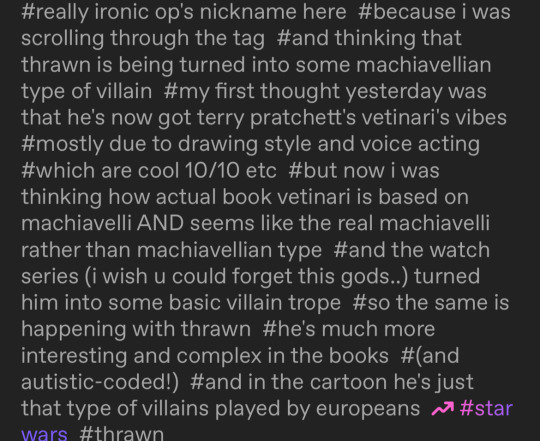
You know what’s funny? Is that Thrawn is really being turned into a “Machiavellian” type of villain, but what’s even funnier is that Machiavelli himself received this type of treatment. Now idk how much familiar you are with the 16th century author, but just know this: Machiavelli and “Machiavellian”, and whatever people can take from him, is heavily misunderstood (I actually really hate the use of the adjective, but perhaps that’s a story for another type). Now I know that Zahn wrote Thrawn based on a certain extent on the Machiavelli archetype (I remember reading it somewhere, pardon if I have no proofs), but I’m actually laughing hard thinking that as characters they are having the same treatment by popular media. Lemme explain: Machiavelli wrote the Principe not because “oh he cynic!1!🥶He mad!1🤬”. No. Machiavelli wrote what he wrote because he wanted to save Italy dalla Ruina, from its ruin. Machiavelli dreamed of a more compact and unified Italy. He had a vision and just as much as Thrawn, he wished to serve his people, Florence (in Thrawn’s case, the ascendancy) and Italy (which didn’t existed at the time).
And now, with Thrawn being reduced as you said in a villan without complex motifs, I can’t help but think how poetic is to be doomed to the same narrative as the figure who inspired your existence. Maybe this was planned all along, I don’t think so personally, but Thrawn is being oversimplified by Filoni the same way Machiavelli gets reduced as just a “pragmatic person” and “the ends justify the means” by everyone (don’t let me start on how wrong the quote is).
To sum up: Thrawn and Machiavellian are rhyming in the same direction in popular mainstream media.
This was my Ted talk, sorry in advance for possible writing mistakes, I just woke up✌️
Hiii! Thank you so much for the spontaneous Ted talk 😄😄 Your parallel between the Ascendancy and Florence+Italy is sooo on point, it blew my mind for a second. Now I have to delve deeper into it
Actually there was a period of time when I was really invested in this topic, I read his 10 letters, history of Florence +the Prince obviously and almost fell from a chair when they put him into Assassins Creed game, but now there're just small bits that I remember. Maybe it's time to refresh things
I didn't know that Zahn was actually inspired by Machiavelli. I'm new to this part of the fandom, so I haven't read anything about him or his working process, but after you mentioned it I'll take a note for the future. I must confess I learned who Thrawn was only during the Ahsoka show and due to the fandom. Like there were so many memes about him here on Tumblr, there's no way fans will hype some basic dude so much. And then my friend recommended the new trilogy
So yeah, it's such a pity that not 1, but 6 books of new material got completely ignored and the character simplified to what we've already seen so many times literally everywhere. You phrased it beautifully
I haven't read the old trilogy yet, heir to the empire, only know the plot in general, but I'm curious what exactly motivates Thrawn to rebuild the empire. And how the characterization of him differs between these trilogies. Is he mostly the same or did Zahn change the character after so many years like Terry Pratchett's Vetinari evolved from the very first version of the Patrician to his later works (I can't help comparing them after yesterday, though I hadn't done it before idk)
So yeaah... At least I'm happy that there're so many talented fans here and we can happily ignore whatever happens on the screen 🙃
#again thank you so much#im always happy to discuss our old blue man#even if i'm still going through the ascendancy trilogy#once i get my degree im so going to draw#and read#also im much closer now to getting him in star wars galaxy of heroes game#sooooon (in a year /j)#star wars#thrawn
24 notes
·
View notes
Note
:nervously off anon: So I watched the Anti-Hero video for the first time yesterday (I know, I know...SO behind the times), and I'm so curious how Swifties are interpreting the very clear symbolism. Like, Taylor is two selves. One of them (the "villain") is her exact presentation out in the world right now. Taylor's lyrics match up with her real self. Her public persona doesn't match up with her lyrics. Swifties don't acknowledge this contrast?
Also, what do they make of the bottle she's drinking from? The one with the Lover video's family crest. Do they not wonder WHY that crest is in a video that is otherwise not about romance? Like, I feel like with close attention to lyrics + close attention to videos + an ounce of attention to how her persona changes from album to album + THE ENTIRE LOVER Era = AT THE VERY LEAST that she is not who she seems (and is most certainly under the queer umbrella).
An even deeper dive will lead you to "she is with Karlie; that crest is signaling Karlie; her songs signal Karlie; Taylor is likely identifying as a lesbian now." Yet somehow they don't see any of it that way, and I wonder how. Maybe willful ignorance. Maybe selection of detail to support their own thesis. Maybe it's the English major in me that makes me pore over this stuff.
My assumption is that many Swifties center their listening experience on how they relate to what Taylor's talking about, so it's more about their own experience and projection than what is actually being written. I know they'd say the same about gaylors, but there are CLEAR motifs in this discography. It's all fascinating but also driving me mad. LOL
Anyway, sorry for the novel. I am still a whole n00b to this fandom and mostly choose to engage with Taylor's world via this corner of Tumblr and through her lyrics. The wider fandom seems like actual hell. LOL
Whew ok I needed a minute to read and process before responding 😂
1. Swifties see the anti-hero more as her battle with fame I think, kinda missing the deeper meaning of her being a completely different person underneath that fame.
2. I doubt they think about the crest at all. I never noticed it until a Kaylor blog pointed it out and showed all the times it’s been displayed. They probably assume it’s just a random design.
3. Her persona changing from album to album actually gives them fuel to say she’s NOT part of the queer community because “the lover era was her activist era, just showing her support, then she moved on from it”
4. They’re NOT looking for signals to Karlie. And they take what she shows them (hanging all over football guy) at face value
5. Projection is a big piece of it. “Loving in secret” to us, is such an obvious flag to the experience of realizing you’re queer in a heteronormative society. I think a lot of them romanticize this instead. They see it as finding a love so special, you want to keep it to yourself. I think a lot of them are obsessed with her work because she describes this intense, earth-shattering love. It gives them hope to find it… but they don’t realize it’s a queer love. And the fact is… 2 women loving one another do share a different experience than a man and woman, because of how women express themselves and understand the universal female experience. Add that to the experience of being queer in anyway. So… they’re kinda holding onto false hope they’ll find a love like she describes. But also there is no other Karlie Kloss in this world 😍🥰
Anyway, my thoughts. Thanks for being brave enough to come off anon! Always love a good chat.
25 notes
·
View notes
Text
《XƎTЯOVerthink》 Kaleidoscope Analysis
Remember those funky little toys called kaleidoscopes you used to play with as a kid? The ones you'd twist and look into it to see shifting reflections with pretty colors? Yeah, yeah these guys.

Well I noticed the new Link Click MV heavily incorporates a kaleidoscope as a visual motif. Throughout the MV there’s imagery involving mirrors and rainbows and repeated patterns and rays of light, all qualities of a kaleidoscope.
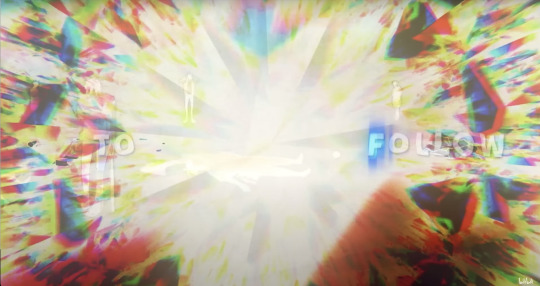

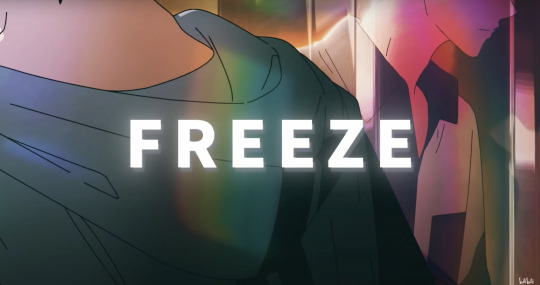

The most direct references are this frame which illustrates the mirror physics of a kaleidoscope:


And this frame illustrating the repeating patterns displayed within a kaleidoscope:
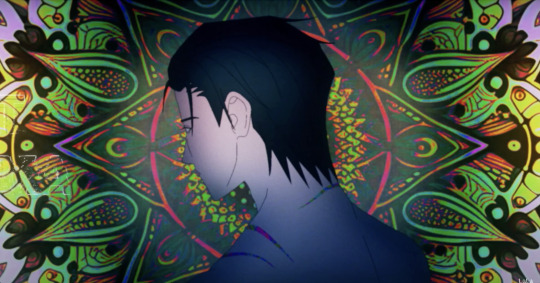
Seeing all this imagery got me thinking as to why it’s all there. The clock and camera imagery within the show make more obvious sense to their meanings, but kaleidoscopes don’t have anything to do with anything we’ve explicitly seen in the show before. However, after some thinking, I believe the kaleidoscope motif is a lot more relevant than it may seem.
The word “kaleidoscope” itself comes from Greek roots, which translate into “observation of beautiful forms”. To me, this MV seems to be painting Red Eyes as the current observer in control of the kaleidoscope.
The aspect of a kaleidoscope being a toy causes me to think about the line from Vortex, “But Imma win this silly game / until then I will never leave”. During those lyrics is when we see Red Eyes appear.
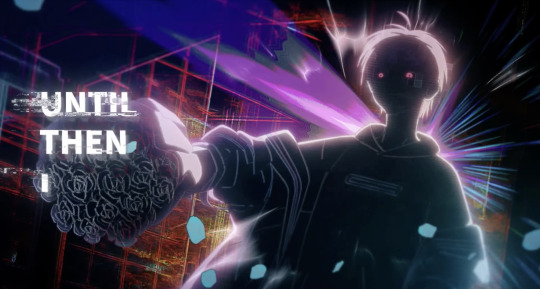
From what we've seen of the two different Red Eyes (likely siblings/twins), they appear to be children. With that info, it wouldn’t be surprising if the Red Eyes we’ve seen take control of Qiao Ling and Liu Min still views this whole thing as a game (toy), especially after being lured into the “game” set up by CXS and LG. Red Eyes is just playing with power to entertain themself, the same way a child would play with a kaleidoscope for entertainment.
Additionally, CXS, along with other characters throughout this MV, appears to be trapped in the kaleidoscope with the way the reflected colored light and fractals or glass are displayed around them. It even seems like Qian Jin is trapped, possibly implying he’s a mere pawn in this game as well.
What I find most intriguing though is the fact that the tiniest rotation of a kaleidoscope creates drastic changes regarding what is seen inside the toy. There’s a seemingly infinite display of patterns. This idea parallels the visuals that show multiple (infinite?) versions of CXS. Some of which are dead, others distraught or gravely injured.

I think the kaleidoscope motif is yet another metaphor for time. Those that have the power to control it with slight changes, the unthinkable number of possible outcomes…thinking of it in this way all starts to make sense. The ones trapped in the kaleidoscope are all at the mercy of time and the ones who control it. Thus, this narrative must rely on “the ones aren’t in control”.
Many have already been speculating this, but I’m also getting the sense that there have been multiple timelines that have been manipulated way before the events of Season 1 began. And those events all involved a sort of engineering of CXS’s fate.
Which leads me to…what the heck is Lu Guang hiding??
One of the first visuals we see is LG falling during the line “When I’ve sunken so low”.

This lyrical imagery can be paired with the line “Knowing it all, am I destined to fall / Like once you did for me”. I feel like these are implying LG has had transgressions of his past. He’s undergone mistakes that have caused him to fall. Again, multiple people have raised this point, but there must be a reason LG is so strict about the time travel rules. Is it because he’s learned them first-hand the hard way before?
What if LG previously manipulated the timelines in order to save CXS over and over again?
Immediately following the “like once you did for me” lyric is a montage of the way LG came into CXS’s life.

This visual and the coupled lyrics add to the idea that LG saved CXS and his past actions led to the moment in time we’re currently watching as an audience.
I also want to point out the line of “Where do we end up when we save the world?”. What if LG already disrupted the timeline enough by saving CXS and has now sworn off any further timeline changes in order to protect the current present, leaving Red Eyes with complete authority over its manipulation. He’s already completed his past objective but is now left dealing with the adverse effects.
Anyways, this is just a theory, a LINK CLICK THEORY.
#sorry this is SO long and is really just word vomit of my thoughts#i had to force myself to cut out a lot of things bc i started rambling w no conclusions#and this was already v rambly#link click#shiguang dailiren#cheng xiaoshi#lc theorizing#lu guang
69 notes
·
View notes
Text
youtube
“Like so many of the stories that we’ve done, many many different elements came together to create a script. Mehndi was one of them and it’s something that I was a little aware of. I’ve done a little bit of reading on it. Not a lot. I believe Rob was the one who came to me, however, and said ‘Wow, this is fascinating’, ‘this is, you know, really great, what can you do with this?’
I had already wanted to grab a hold of the reincarnation idea and there are a few elements that fuelled this. One I’m going to have to reference is a song by Paul Williams, which was in The Muppet Movie. And there was a line in this one song that I felt, and I’d always felt this way, described the two characters perfectly. The line was ‘there’s not a word yet for old friends who have just met’. And I thought you know something? They are old friends. They just met. But they’re old friends. So in my mind throughout history and throughout destiny, these two characters’ souls have existed and have met, parted ways, met, intertwined, parted ways. And that fit in perfectly with the reincarnation theory but what was important for these two characters is that those two souls have throughout history intertwined, they’ve come together, they’ve parted ways, they’ve come together again, they’ve intertwined, they’ve parted ways. This has happened continuously and every time it happens in their lifetimes, they recognize each other. Not like ‘oh, you’re Xena, oh, I’m Gabrielle’. No no, they say ‘I know you. I know you and I have to be with you. I don’t know why but I do’.
Now bringing the Mehndi into it. Mehndi was perfect symbolism to this because when you think about it, Mehndi, um, if you’ve done it and if you’ve read up on what Mehndi means, it’s not just drawing. Mehndi has an entire meaning behind it. There’s a whole philosophy and spirituality based on Mehndi. The simplest part of it was the fact that Mehndi has a lot of lines that run parallel to each other and they will intersect, they will form beautiful designs, then they will part again and run parallel. Well, that’s lives. Xena and Gabrielle - those are the lives. Those are the threads of their lives. They run parallel to each other, they intersect, form beautiful designs. Then they might part but they still run parallel to each other. And what really counts is what’s between those lines. There’s the title; ‘Between The Lines’.”
Half the reason why they ended up taking the soulmates motif so seriously and literally was due to Steven L. Sears and his reincarnation idea and understanding of Xena and Gabrielle’s soulmate connection. So, in my view, half the reason why the love story is so damn profound is because of him.
Now he would be the first to scoff at that and say that I’m giving him far too much credit. But that is exactly why he is amazing and deserves that much credit.
‘Between The Lines’ took the relationship between Xena and Gabrielle to a whole other level because we do learn that they actually are true to life soulmates and all of what that informed and involved for them as individual characters as well as together as a couple. And so everything leading up to this episode now felt so much more intense and deep and poignant.
Substantial. And I wouldn’t have been able to write my character study thesis without it. Even though I don’t directly mention it - it’s sort of just embedded within the insightful interpretation that I’ve made about it because this episode doesn’t just tell a one-time storyline about the characters. It essentially informs EVERYTHING about them. Who they are and why - and especially how they are such a great team that navigate their soulmate connection to be just that.
It’s like these two people who seemed to be total strangers until this episode was seen were actually destined to meet and travel together and fall in love because their very soul that they shared fated it so.
And by the gods - I have yet to see or know a relationship that is that damn EPIC on-screen.
Xena and Gabrielle are the WLW representation you expect to be provided - considered canon or not - because this level of storytelling between female characters that can be interpreted as romantic just doesn’t happen anymore. There’s no time or room for it to in the TV art/entertainment industry apparently.
#xena warrior princess#between the lines#interviews#xena#lucy lawless#gabrielle#renee o'connor#steven l. sears#john cavill#rick jacobson#this is a writer’s room full of white cishet men#and every single one of them deserves my respect#you know the saying that white straight men can’t write feminism or queer storytelling#well all these white straight men prove that completely false#and they’ll deny it#every single one of them will deny that they should be credited for it#but that’s exactly why they deserve to be
17 notes
·
View notes
Text
LMK Story Motif
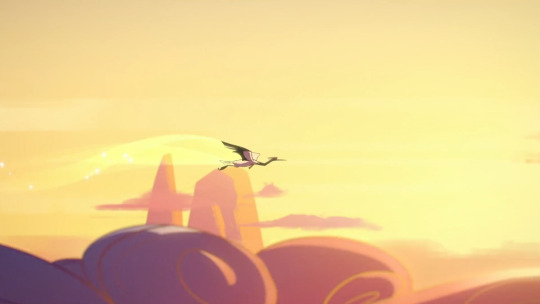
Tang: “The thing you need to understand about the old legends, is that the story is never finished. There maybe be no more pages left to turn, but there’s always more to the journey. “
(1x00 A Hero is Born)
-
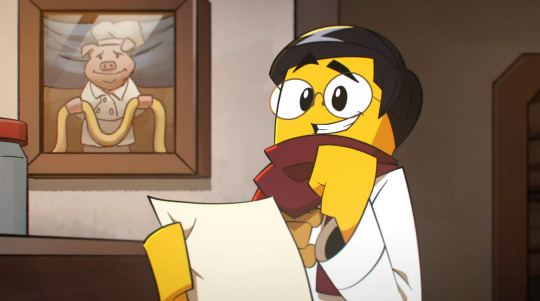
Tang: “It’s nice to know someone is taking in all these stories—pearls of wisdom, DRIPPING from my lips.”
(1x00 A Hero is Born)
-


Mirror MK: “UGH, stop that! Listen- every time we get in trouble, we turn to Monkie King or our friends or SOMEONE. They tell us a story, and we find that smidge of motivation we need. Well! Now we’re on our own. It’s just you.”
(2x00 Revenge of the Spider Queen)
-
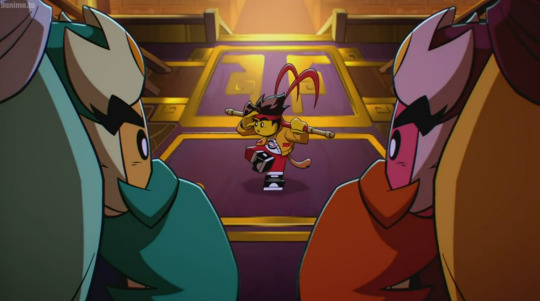
MK: “Wait! I am worthy, definitely worthy! I’m Monkie Kid! Basically the new Monkey King—might have heard of me? You know, the next chapter? I’m totally worthy!”
(2x01 Sleep Bug)
-
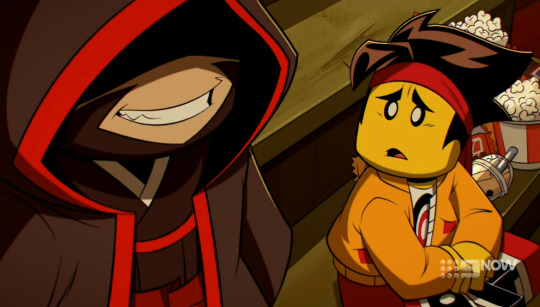
Totally Not Macaque (TNM): “Haha, what would you like to hear—the Hero suddenly remembered his beloved friend the Warrior? That they lived happily ever after?”
MK: “No! Nah no no no- well uh, yeah! Maybe. Um. Okay, I don’t know why I’m telling a complete stranger this but, I guess...I kind of feel like the Warrior in the story. A little. Is that dumb?
TNM: “I take that as a complement young man.”
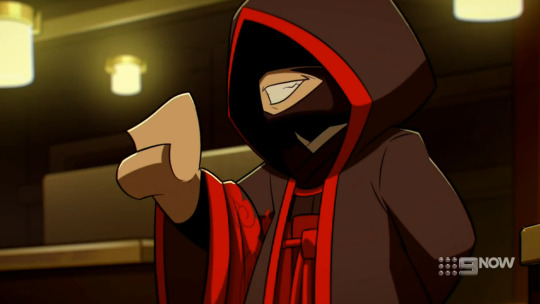
TNM: “The tell-tale sign of a good story—that you resonate with it so personally. But I think maybe you missed the point.”
(2x07 Shadow Play)
-
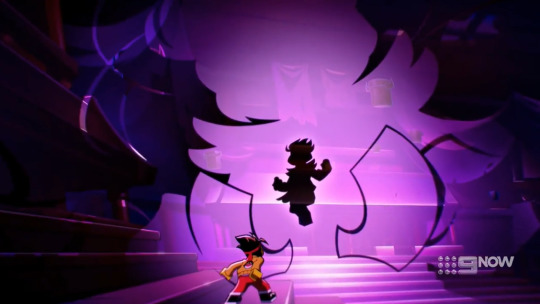
Macaque: “Ah MK, you really are dense, aren’t you. Haha, you saw a story about a hero who got handed everything, who didn’t have to work for anything, and you thought you were the other guy? The second the hero got real power, he couldn’t care less about his friends. That’s you bud.”
(2x07 Shadow Play)
-

Tang: “Now, any chance at hope lies in the hands of a monkey, and a kid who wishes he was a monkey.”
MK: “Ugghhhh Mr. Tang! Would you quit it?
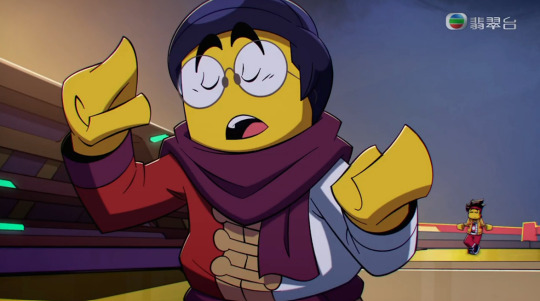
Pigsy: “You’ve been reading your diary out loud LITERALLY all day. You’re bumming everybody out!”
Tang: “Hey! It’s not a diary, I’m writing the next chapter!”
(3x01 On the Run)
-
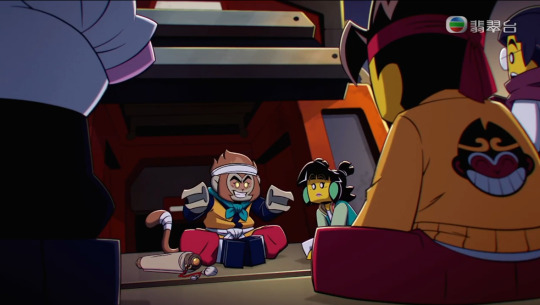
Sun Wukong (SWK): “Okay! Gather round everyone, it’s Monkey King story time!”
(3x01 On the Run)
-
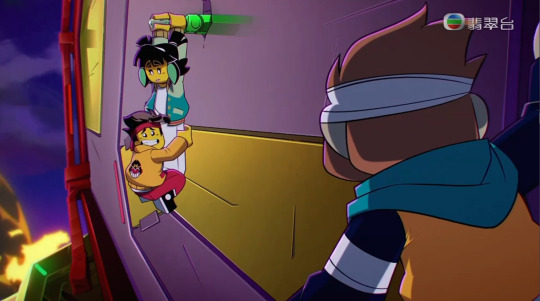
SWK: “Kid, why did you...?”
MK: “Uh, well yeah- I- I was trying to do you in- in the omelet story! Do the weird impulsive Monkey King thing and escape the bad guy!”
SWK: “Well, I mean- Ne Zha ain’t really a bad guy but, did you forget about the part where I got really hurt?”
(3x01 On the Run)
-
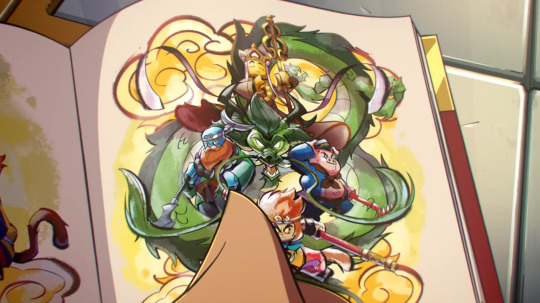

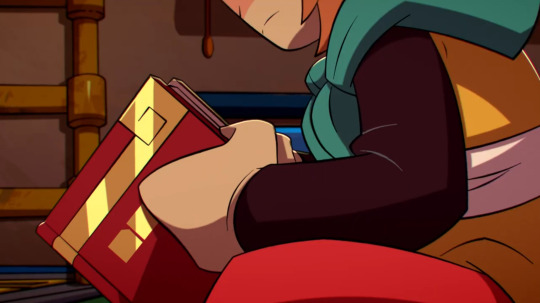
(3x05 Amnesia Rules)
-
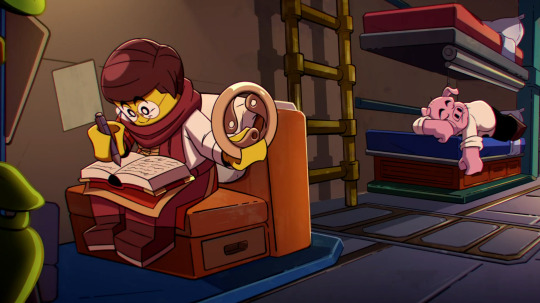

(3x06 The First Ring)
-
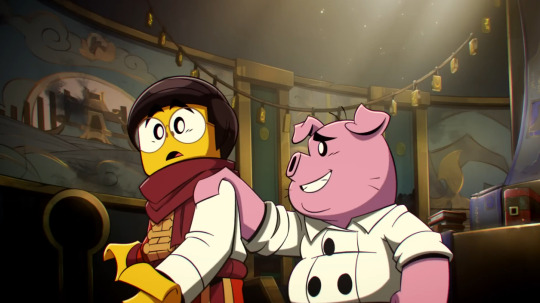
Tang: “But...compared to the great monk, I’m not so...great.”
Pigsy: “You’re pretty great to me tang. Besides, you’re story ain’t over—not yet.”
(3x12 The Corrupted King)
-


Tang: “MK, from the moment you picked up the Monkey King’s staff, their stories became our stories. It’s our responsibility to write the final chapter, no matter the outcome. If we do this, we do it together.”
(3x13 Time to Be Warriors)
-
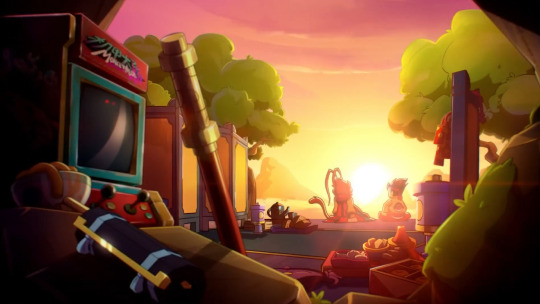
Tang: “The curious thing about legends is the way we can continue to be moved by the same stories. We’re comforted by familiar tales of friendship, courage, redemption. At times, the path of the hero might seem unclear, and the stories chaotic and directionless. Sometimes it may seem as though we’ve ended back where we began, but it’s clear to see how much we’ve grown on the journey—for although the story is over, there’s always room on the shelf for another.”
(3x14 Destiny Fulfilled)
-

MK: “I wasn’t really gonna slice ‘em and dice ‘em you know, I just- I just thought we looked cool and edgy! But like, what if this is the point in our heroes journey where things get a little bit...darker.”
(4x01 Familiar Tales)
-

MK: “You’re telling me that I’m holding THE Journey to the West legend in my hand right now?”
Azure Lion: “That and a great many other tales I’m sure."
(4x02 New Adventures)
-

MK: “Alright! Find our friends, defeat the curse, and get back to the good old fashioned story of the week!”
(4x03 The Great Tang Man)
-

Tang: “L-listen you! Stop holding onto the past, it’s time to go!”
“Aah! What did I say before—earthly connections can only weight you down? Well, I don’t believe it! Your time with your family was precious, and nothing will ever take that away. The memories we make with the ones we love—they’re what lift us up! Your time here is over, but that doesn’t mean your story is finished—you’re not being cast out or pulled down, you were being lifted up!”
“The next chapter is calling you to start a new adventure, it’s time to answer the call!”
(4x03 The Great Tang Man)
-

Tang: “That’s it! This Tang has had it! We’ve been through a bajillion chapters from Monkey King’s Journey to the West, and I feel like we’re no closer to finding Pigsy, Sandy, or Monkey King!””
(4x04 Pig Napped!)
-
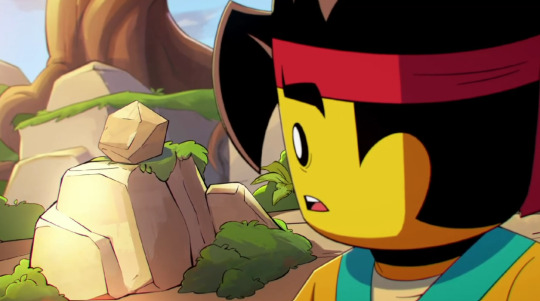
Subodhi: “A simple creature, with no past, no family, and no name. There is a reason you were at the center of these stories—a reason you can harness the power of the Monkey King himself!”
“Without question, you were not born from the stone as he was! Who or what you are, even I do not know the answer; but, of one thing I am certain, fate has plans for you—great plans, or foul? Time will tell.”
MK: “I- I can’t be! I’m just- I’m just MK!”
Subodhi: “The Monkie Kid?”
(4x06 Show Me the Monster) (Isn’t it so funny that he’s named MK? Like the initials of Monkey King? Haha. It’s so funny isn’t it? HAHAHA. YEAH. I’M HAVING A GREAT TIME. THIS IS SO FUN.)
-
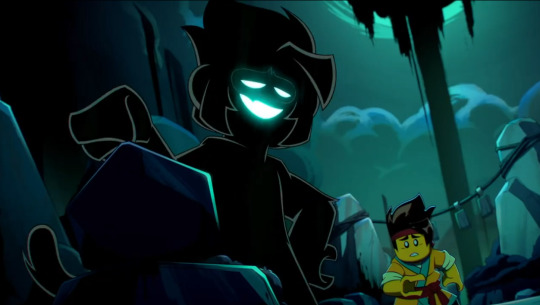
Curse MK: “Hey no no I get it man—you want to get back to our monster of the week adventures, get back to our simple missions with Mei, mastering all of Monkey King’s powers and delivering noodles for Pigsy. Right?”
MK: “Yeah. Yeah actually, that’s exactly what I wanna-”
Curse MK: “-But we can’t. Not after all we’ve seen. All we know and all we don’t—*sigh*, right friend?
(4x07 Pitiful Creatures)(THE HERO’S JOURNEY INTENSIFIES. MK IS NOT RETURNING WITH THAT ELIXER)
-

MK: No matter what I do, it’s going to lead to pain. It’s like the Lady Bone Demon said—it doesn’t matter if I want to help people or NOT, everything I do it just- it just makes things worse!
Mei: “You’re all stuck up in your own head! None of this is your fault-”
MK: “It’s ALWAYS my fault! Ever since I picked up monkey king’s staff, I-”
(4x08 The Brotherhood)
-

Ne Zha: “We should have stood and fought till the end.”
MK: “We didn’t stand a chance against them, if we'd stayed, it wouldn’t of made a difference.”
Ne Zha: “So you’re just gonna stand aside and let Azure become the new Jade Emperor!?”
MK: “There’s only one person who ever stood against the Jade Emperor and lived to tell the tale.”
(4x10 The Jade Emperor)
-
Stories, Legends, and Tales.
#FUCKING DYING Y'ALL#LIKE.#THE STORY MOTIF LEGITIMATELY MAKES ME GO RABID#I needed to make this post before I wrote a meta/theory post#it's gonna be fucking GOOD Y'ALL#I'M. I'M DYING#Do you know what 4x06 does to a person. Do you even understand#All of our characters are dead men and the story was over since the beginning#Our characters are living past their stories and have been doing so since the start. Now they're DOUBLY living past the end of their stoires#LIKE LADY BONE DEMON SHOULD HAVE WON. THAT'S WHAT DESTINY HAD IN STORE#YET MK DEFIED THAT DESTINY#HE IS A DESTINY DEFYING BOY. DO YOU GET IT.#THE SAMADHI FIRE SHOULD HAVE BURNED MEI. PENG AND YELLOWTUSK NEVER SHOULD HAVE BEEN FREED FROM THE SCROLL.#Every single fucking character is living past the end of their myth#lmk#lego monkie kid#monkie kid#story motif#lmk mk#lmk meme#lmk macaque#lmk tang#lmk swk#lmk sun wukong#I'm eating both of my legs! I really am!#lmk story motif#lmk parallels
67 notes
·
View notes
Note
Hii tamelee! If I remember correctly, you’re studying storytelling, is that right? I wondered if you could explain in details what kind of school you’re going, or just what exactly you are doing in your studies? If it’s okay with you of course 😊
Have a good day :)
Hi~! Yeah, sure!
I did marketing, (communication and entertainment), but then finished audiovisual and graphic design because I liked that much better than learning about how manipulative the industries are tbh. Unfortunately, I found out quickly, that pretty much every job in that industry has been taken over by AI and that even me learning how to draw wasn’t going to help me with that anymore either 🥲. Then, I continued doing Storytelling in the communication sector (where, yet again I learned about all the ways people are being manipulated -.-) because it’s quite a new official study. And then, I was accepted to apply for the program that focusses more on fiction— and got in. Which I’m doing right now (though I’m almost done).
In short, what I learned about Storytelling in business is that organizations use the elements of fictional storytelling combined with science (both internally and externally) in order to influence and convince the attitude, knowledge and behavioral patterns for the right audiences that are targeted by a certain communication goal. That goes so far that even the science about our brains are dissected to figure out the best ways in which the organization can redirect your neurotransmitters and hormones to benefit the storyteller. Even if you know you’re being manipulated, (for example, through a commercial that’s shamelessly stomping on your morals through a guilt-trip, or a product in the store that’s obnoxiously being shoved in front of you), often it’s still about targeting your subconscious and trust me when I say that if you enjoy spending time on the internet, it happens to you all the time and you don’t even know it :D
And yes, companies like shueisha/VIZ are masters in this as well— hence me disappointingly complimenting that skill at times.
So, imagine my joy when I crossed the bridge toward fiction.
Fictional storytelling is where I dissect not the science of a human brain exactly, but the story that’s being told. I have to figure out all the elements and literary devices that are being used and what they mean in the story. Not what it means to me, but finding meaning through the Theme the author/creator has used, and why. It’s about how a story is structured and what impacts people on an emotional level for their benefit (mostly). Why a story works and keeps you up all night, why others are usually almost always forgotten quickly. It’s not as subjective as people may think. Interpretation doesn’t mean much unless there’s intentionally room for it. (And when something is intentional or when it’s not.) There’s also science in its logic, but that’s not something most authors/creators focus on. And they really shouldn’t have to imo. It’s also knowing about character arcs and how to implement symbolism and motifs effectively. I have to write essays on movies and books or even TED talks. It’s using knowledge to figure out the why, what and how.
I think it’s awesome as a study, but other than some creative writing lessons, it won’t help me with great prose. It’s hard for me to connect with my own emotions and body which is something a lot of great authors can do really well. Either naturally or having to have practiced the connection with their personal emotional intelligence in order to write their Truth in their own authentic way through their characters. I read many books outside of my study from scriptwriters as well which were helpful. None of it is any reassurance I’ll be able to write my own story effectively though. It’s more a guideline of sorts with knowledge and structure which a neurodivergent like me (yes, I’m diagnosed officially) really needs xD. I still have to practice a lot! ^^ Hope you have a good day as well 🌷!
10 notes
·
View notes